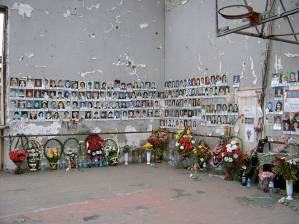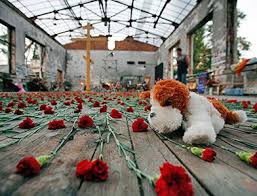Court in Strasbourg accepts case against Russia over Beslan

The lawyer representing Beslan victims says he is now virtually certain of a European Court of Human Rights judgement finding against Russia over its failure to prevent the tragedy at Beslan and to investigate and punish those responsible
Almost 11 years after the terrorist siege and subsequent storming of a school in Beslan, the European Court of Human Rights has found most of the applications brought by victims or relatives admissible. Although this suggests that Russia will be found to have been in violation of the European Convention, the judgements on merits may still be a long way off.

Just after 1 p.m. on Sept 3, 2004, Russian federal troops stormed School No. 1 in Beslan where over 1100 children, teachers, parents and grandparents of children had been held hostage since the morning of Sep 1.
The storming of the building began after explosions were heard, and a large number of the casualties were due to 3 explosions and the resulting fire. Others were shot trying to escape from the building. 186 children and 145 adults were killed, most during the storming. The authorities have always claimed that the explosions came from within the building. Explosives expert Yury Saveliev, however, believes that they were caused by grenades thrown from outside the building. Since the explosions were used as the grounds for storming a school hall in which over 1100 children, teachers, parents and grandparents were held hostage, it is of major significance where the explosions took place.
All the applicants (there are seven applications, involving 447 applicants) cite violation of Article 2 (the right to life). The Court explains that “applicants maintain, in particular: that the State has failed in its obligation to protect the victims from the known risk to their lives; that there was no effective investigation into the events; and that many aspects of the planning and control of the negotiations and rescue operation were deficient. Some applicants maintain that the deaths were the result of a disproportionate use of force by the authorities.
Some applicants further allege violations of Articles 3 (prohibition of inhuman or degrading treatment), 6 (right to a fair trial), 8 (right to respect for private and family life), 10 (freedom of expression) and 13 (right to an effective remedy).”
The Court struck four people out of the list of applicants altogether and declared inadmissible the applications lodged by 51 applicants under Article 2 and Article 13, (as well as certain applications under Articles 3, 6, 8, and 10).
It did, however, declare admissible all other applicants’ complaints under Article 2 and Article 13, stating that judgement on these would be “delivered at a later stage”.
According to Kirill Koroteev who is representing Beslan victims, the complaints found admissible pertain to the following:
the question of prevention. They maintain that the Russian authorities had sufficient information, but did nothing to prevent the attack;
specific use of weapons, indiscriminate action with respect to the school and the planning of the military operation as a whole;
the investigation which in almost 11 years has not managed to establish all cases involving indiscriminate force (flame-throwers, grenades, tanks) and has not resulted in those responsible for deaths caused by such weapons being identified and punished;
the unwarranted delay in measures to put out the ensuing fire in the sports hall.
“This is a very important judgement. I would say that a key phase in the court hearings into this case has been passed. Now the parties will have the opportunity to present new arguments and demands for just compensation and then there will be the judgement on merits”.
Koroteev adds that in his experience, where the Court has found applications admissible, 85-90% result in judgements in favour of the applicants.
He adds that “only one thing can save the Russian government from a historic judgement which will hit the image of the country’s leaders very hard. That is if during the time remaining (the judgement will probably be issued within a year), an adequate, i.e. fundamentally new investigation of all circumstances of the Beslan Tragedy is finally carried out. Furthermore, the government must not only manage to investigate, but also to punish those responsible. Both those who failed to prevent the terrorist attack, and those who took the decision to use heavy artillery during the storming and who bear responsibility for the death of hostages. If the Russian Federation government continues to avoid answering specific questions put to them by the victims of Beslan and talk about terrorism in general, I am virtually certain of the outcome of these applications”.
Halya Coynash





